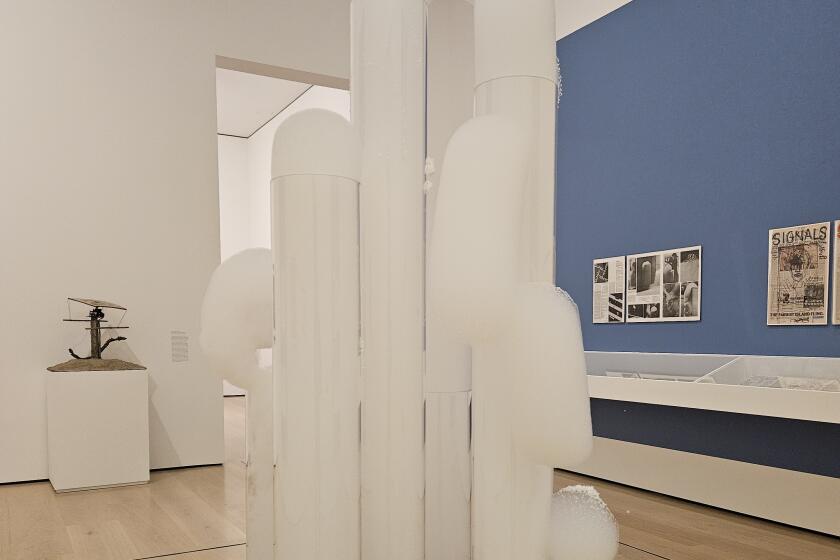STAGE REVIEW : ‘Seagull’ Is a Flight of Caring, Knowing
It is not to be supposed that a Charles Marowitz staging of Chekhov will leave the viewer with warm, fuzzy feelings about the human race.
Marowitz’s staging of “The Seagull” for the Los Angeles Theatre Center is Chekhovian, all the same. The point of view is that of Chekhov the physician, shaking his head at how self-destructive his patients can be.
What is important in this production aren’t the visual gimmicks, such as having young Konstantin (Judd Nelson) stage-managing the first part of the evening, as if the members of his family were characters in one of his plays.
In fact, if Konstantin had been able to view his situation this objectively, he probably would have been able to improve it. Chekhov remains the story-teller here, and Marowitz stresses the critical side of his intelligence, rather than his compassion.
This “Seagull” doesn’t lack emotion. Nelson’s Konstantin is all too full of it and, paradoxically, all too starved for it. It’s wonderful when Nelson and Nan Martin, as his actress mother, Arkadina, fall into each other’s arms after having called each other every nasty name in the book, excluding “critic.”
But it’s equally wonderful that Martin’s Arkadina is usually too keyed-up to have emotions.Marowitz keeps the cellos down in this production. He wants us to see exactly what’s going on between Chekhov’s people. If they are all victims of life, some of them are more accountable than others.
Jonathan McMurtry’s Trigorin, for example, may be suffering from an authentic mid-life crisis, the kind that is only exacerbated by worldly success, in his case, as a writer. We can sympathize with his fear that he is turning into a walking fountain pen.
We can also see that he’s a killer. Chekhov doesn’t fault Trigorin for flirting with the aspiring actress, Nina (Mary Crosby). The sin is to use her and throw her away, like an early draft of a story. The fact that the process may also pain Trigorin isn’t to the point.
It’s clear in the last scene that Crosby’s Nina has been broken in two, although she may put together some kind of theatrical career in the provinces. Nelson’s Konstantin has, in contrast, been broken down by life, even though he has hardly reached his entry point as a writer.
And what does his mother, Arkadina, feel about that? Great satisfaction, to tell the truth--and Martin’s Arkadina all but does tell us. The young man has learned that talking about an art isn’t the same as doing it.
Another killer. There’s something Darwinian about this “Seagull.” It’s a study in how the strong feed off the weak, without admitting to themselves what they’re doing. Arkadina really does feel too strapped to buy her son a good suit. Trigorin really does feel absolutely powerless to make decisions. But they are the ones still sitting at the table, playing lotto, as the curtain goes down.
Chekhov sees this process as quite natural and quite reprehensible. In general, life in this play is presented as a losing bargain. The sick get sicker (Philip Abbott as Sorin, the one older person Konstantin can talk to). The unlucky in love grow more so (McNally Sagal as Masha and Peter Van Norden as her hopeless suitor Medvedenko). Adding faithlessness to the mix just makes it more grim.
Yet he called “The Seagull” a comedy, perhaps because it reminds us that the game does go on, however unfairly.
Marowitz’s company keeps comedy in mind at all times, even when not overtly playing for it. Characters are crisply outlined, even at the risk of being cartooned--a problem with Sagal’s poker-faced Masha and even, at times, with Martin’s high-elbowed Arkadina.
Nobody falls into the Chekhovian doldrums: In fact, Robert Symonds’ Dr. Dorn is as brisk as if this was Moliere. The lights (by Toshiro Ogawa) are up. Noel Taylor’s costumes and Ralph Koltai’s set enhances the production’s clarity, the latter with its device of using a big, striped pyramid behind the players to serve as the lake where the action is set, almost a Steinberg conceit. We don’t feel the lake until that last off-season scene, when it glows like a blue ghost through the rain-dashed windows.
This “Seagull” keeps its distance, without failing to make you care--and better, to make you understand--what happens to its people. Marowitz can be a crank when he tries to turn a classic into the play he would have written. His intent here is to discover the play that the author actually did write. Chekhov would recognize this “Seagull.”
Plays Tuesdays-Sundays at 8 p.m., with Saturday-Sunday matinees at 2 p.m. Closes Nov. 13. Tickets $22-$25. 514 S. Spring St. (213) 627-5599.
More to Read
The biggest entertainment stories
Get our big stories about Hollywood, film, television, music, arts, culture and more right in your inbox as soon as they publish.
You may occasionally receive promotional content from the Los Angeles Times.






